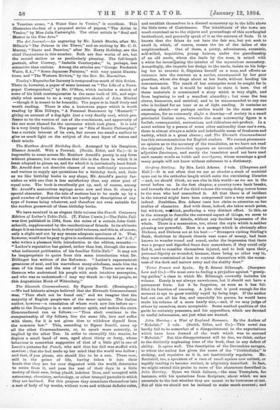The Eleventh Commandment. By Signor Barrili. (Remington.) —We had hitherto
always believed that the Eleventh Commandment was, " Thou shalt not be found out," and we imagine that the majority of English people•are of the same opinion. The Italian author, however—a translation of whose work now lies before us— adds to the Deoalogue in a more serious spirit, and makes the extra Commandment run as follows :—"Thou shalt continue in the ,00mpanionship of thy fellows, live the same life, love and suffer with them, for it is not given thee to withdraw thyself from the common law." This, according to Signor Barrili, sums up all the other Commandments, or, to speak more correctly, is implied by the other Ten. In order to exemplify this maxim, he depicts a small band of men, aged about thirty or forty, whose behaviour is somewhat suggestive of that of a little girl in one of Leech's pictures for Peach, who said that her doll was stuffed with sawdust ; that she had made up her mind that the world was hollow ; and that, if you please, she should like to be a nun. These men, still in the prime of life, having taken it into their heads that they are for ever disgusted with the world, determine to retire from it, and pass the rest of their days in a little society of their own, living placid, indolent lives, and • occupied with astronomy, chemistry, archaeology, or other tranquil pursuits to which they are inclined. For this purpose they constitute themselves into - a sort of body of lay monks, without vows and without definite rules, and establish themselves in a disused monastery up in the hills above the little town of Castelnuovo. The inhabitants of the town are much exercised as to the objects and proceedings of this newfangled brotherhood, and generally speak of it as the convent of fools. It is known that the friars do not hate the fair sex, but yet seek to avoid it -which, of course, rouses the ire of the ladies of the neighbourhood. One of these, a pretty, adventurous, eccentric, self-willed, inquisitive, young heiress, under the guardianship of an old uncle, whom she leads by the nose, is seized with a whim for investigating the interior of the mysterious monastery. Accordingly, she imparts her design to the uncle, insists on his help- ing her to execute it, disguises herself as a man, and effects an entrance into the convent as a novice, accompanied by her poor guardian, whom she drags about at her heels, without heeding his remonstrances. The result of her enterprise must be sought for in the book itself, as it would be unfair to state it here. Out of these materials is constructed a story which is very slight, and from beginning to end a manifest absurdity ; but none the less clever, humorous, and satirical, and to be recommended to any one who is Inclined for an hour or so of light reading. It contains an amusing sketch—or perhaps outline would be the more correct expression, for so extremely slight a drawing—of society in a small provincial Italian town, wherein the most noteworthy figure is a foolish, consequential, sententious, and ridiculous sub-prefect. In .a novel written by a person of some other nationality than one's, own, there is almost always a subtle and indefinable sense of freshness and variety, which is a great charm ; and The Eleventh Commandment has this recommendation for English readers. We cannot pronounce an opinion as to the accuracy of the translation, as we have not read the original ; but Danteskish appears an uncouth substitute for the adjective Dantesque, and surely the translator need not have used such remote words as bolide and marchpane, whose meanings a good many people will not know without reference to a dictionary.






































 Previous page
Previous page